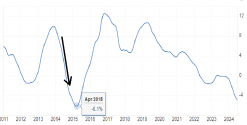In terms of elevated risks for the long term, analysis of alternative situations is useful. Is it comparing the present state with a hypothetical alternative state where a brief consumption stimulus was enacted? Or a state where the property reform was never conducted, or reform conducted earlier, etc?
Initial conditions matter given the chaotic nature (uncontrolled system) of the economy. Had we not had the lockdowns in 2022 (which *really* sapped confidence - businesses/consumers alike - people on the ground were of the view that the government did not care about the economy), we would be looking at a different situation - in that case I would be arguing against any change to the current actions.
As a counterfactual, if consumption growth was say 10% in 2023 and running at 6% in 2024 (as opposed to 7.6% and 3.5%), that's a trillion+ delta which would be additive to GDP, and without this deflationary pressure (meaning deflator is positive, and not negative).
There are those who would argue that consumer confidence would've come down anyways with real estate prices coming down, but a slower (as opposed to an immediate) grind down would've been easier to manage.
Given that you can't dial back time on Covid lockdown failures in 2022 and the drastic negative impact of 2022, you cannot simply stick to the original plan and pretend everything is on track.
Based on the "toothpaste squeeze" of easing measures, I am of the view that regulators
look like they do not have a credible long term plan and the policymakers are behind the curve (if not shellshocked) -
even if they did have a plan.
Had there been stimulus in early 2023 (Jan-March consumption data was extremely strong - baijiu was growing at 25% during the CNY in 2023), you likely would've erased any doubt that 'the government didn't care about growth'.
Actually I would pose that question right back to you, given you are the one raising this as a major long term threat.
How long and how deep would poor confidence have to occur for, for medium and long term economic and geopolitical objectives to be likely to be unattainable?
The longer they wait, the bigger the eventual stimulus would need to be. I'd say we have about 18-24 month before we run out of policy room to reverse this debt-deflation loop.
Put in other words, this would've likely been fixed with:
- 1.4 trln package (1000 RMB per person as a "Thank you for doing your part to help us combat the pandemic" dividend) in early 2023
- 2-3 trln package in to bail out real estate in early 2024
- 7-10 trln package today that would need to do both of the above + do more on social security.
Note, this isn't to say that technological improvements won't keep happening - but there is a point after which an entire generation's mindset will have been set - esp. with respect to their habits. As an extreme scenario, the economy does not very work well when
everyone wants to save 1 or 2mln RMB and lie flat in Lijiang. (even though that isn't a bad life)
And look my final point is, I really hope I'm wrong about my worries here.
I'd rather look like a fool here and be wrong and this works out w/o a major hitch - because I've got a lot more to gain in my real life if that happened.
But hope has never been a strategy.

